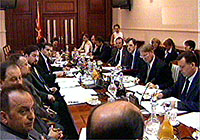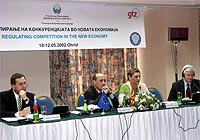|
Enter content here
AGREEMENT ON ALL OPEN ISSUES REACHED AT LEADERS' MEETING.
MIA

"I want to express my satisfaction that the leaders' meting ended successfully. An agreement has been reached upon all open issues," President Boris Trajkovski announced at the press - conference held Saturday, also attended by EU Special Envoy to Macedonia Alain Le Roy, State Department special advisor to the country James Holmes, American Ambassador Lawrence Butler and the chief of OSCE mission, Craig Janness.
President Trajkovski assessed the meeting as a step forward towards the implementation of the Framework Agreement, by which conditions for fair and democratic elections in the country were met.
"By passing these laws we will enhance democracy in Macedonia, as well as strengthen the political stability and prosperity in the country, thus enriching the interethnic relations and bring Macedonia more closely to the EU family of nations," Macedonian President stated.
He also said that although one phase of the implementation of the Framework Agreement was over, he appealed to all political structures and citizens in the country to continue with the implementation process.
President Trajkovski expressed his hopes that what has been agreed at the meeting would be adopted at the first Government session next week. "I expect for the ministries, along with the deputies, to adopt the package of laws," said the President.
Le Roy confirmed the constructive atmosphere during the discussions, which, according to him, was created by all signatory parties of the Agreement.
He said that 16 laws have been adopted so far, part of which were passed by the Macedonian Government in the course of last week, supported by the fourth signatory political party SDSM.
According to his words, the clear agreement on the side of all four leaders regarding the election model, "presents a solid position for the stability in the country as well as progress in the process for fair and democratic elections."
The special advisor of the State Department for SEE, James Holmes, said that the real winner in these negotiations were all citizens in the Republic of Macedonia. He expressed his belief that the foundation, which was laid in the past few days would prove as useful for the future and peace of the country.
Holmes also said that "although this political agreement serves as a base for fair and democratic elections, the international community should put some additional efforts and engage experts as well. International community should also be physically present at the elections to make sure that they are being properly carried out." He also conveyed his greetings to President Trajkovski, saying, "he represented the interests of each Macedonian citizen in any sense".
Craig Janness estimated the meeting as a process that led towards stability of the country and interethnic mutual life.
The meeting participants expressed their firm belief that there would be no obstructions by the deputies regarding the adoption of the proposed laws.
VMRO-DPMNE Vice President Marjan Gjorcev and Trajko Veljanovski, Gjorgi Spasov from SDSM, DPA President Arben Xhaferi and Vice President Menduh Thaci, and Justice Minister Ixhet Memeti as PDP representative attended yesterday's formal plenary session.
Why Macedonia Should Withdraw from the International Criminal Court.
Dnevnik
By Jason Miko
The United States of America has caused a lot of consternation among the countries of the world recently by announcing that it will, in effect, have nothing to do with the recently launched International Criminal Court (ICC), a court which Macedonia has signed on to. Some of that criticism has come from Macedonians as well.
So that there are no hard feelings, like me make a modest proposal Macedonia should withdraw as well.
Im not suggesting that Macedonia should withdraw just because the USA doesnt want to have anything to do with the ICC. Im suggesting that Macedonia withdraw for many of the same reasons that the USA puts forward, namely, an un-elected body of judges accountable to no one deciding the fate of nations. Something similar to the court at The Hague today.
The Washington Post noted Pierre-Richard Prosper, the U.S. ambassador at large for war crimes, said that the goal of an international tribunal is 'noble' but that it would be better to help governments enhance their own judicial capacities to try war criminals on their own soil. Well, I thought that is what USAID has been doing here for ten years. Could it be that in ten years they have not accomplished their goals? Or is it something else?
Senators Jesse Helms of North Carolina, a Republican, and Zell Miller of Georgia, a Democrat, recently wrote an opinion piece in The Washington Times criticizing the ICC. It is worth noting their wisdom in this: It needs to be understood, however, that the ICC is without supervision or oversight. And, most alarmingly, this new court will claim jurisdiction over citizens of countries that have not agreed to be members of it. The ICC's jurisdiction will not be controlled or limited by any country's constitution or legislature. It will answer only to itself. This is not responsible government.
History teaches us that unchecked power is quickly and inevitably abused. Our Founding Fathers correctly identified limits on government power as the key to protecting individual liberties. This is a bedrock norm that should be applied to all international and national institutions.
The Washington Post on May 7th reported Undersecretary of State Marc Grossman, in announcing the US decision not to be involved, as stating, "We believe that the International Criminal Court is built on a flawed foundation.
These flaws leave it open for exploitation and politically motivated prosecutions."
Hmmm. Politically motivated prosecutions. Sounds a bit familiar to me.
I can well understand the sentiments of many Macedonians who recently started a campaign to see that Interior Minister Ljube Boshkovski does not go to The Hague, even if indicted, of which there is no indication so far. As one who does not support the idea or existence of The Hague, I agree on this point. The ethnic Albanian population of Macedonia, as well as Albanians in Kosovo would do well to learn something here. If The Hague goes after Croats, Serbs, Bosnian-Serbs and, potentially, Macedonians, then it may at some point go after Albanians (if there can be any justice in this farce of an organization). And if it does, the Albanians are going to have to accept that instead of campaigning for indictments and gloating every time Carla del Ponte issues another indictment against a non-Albanian. (I should add that even if it did go after Albanians, I would still not support its existence).
The international community told us that once Slobodan Milosevic was behind bars, the countries of the former Yugoslavia would be at peace. Well, Ive got news for you. Mr. Milosevic is behind bars, but there is no peace here. Thats because, firstly, the international community needed one villain with a very public face to blame all of the wars in the former Yugoslavia on. That was necessary to get their publics behind them in bombing Bosnia and Yugoslavia and then invading it and occupying it (You see, us folk in the West need bad guys to vent our anger on - and more than one bad guy in the pot confuses us).
Secondly, now that this has been accomplished, the international community has shown, so far, the lack of will power to go after the rest of the criminals in the former Yugoslavia. And if, as some argue, The Hague doesnt have the jurisdiction to tackle some of the terrorists and mafia networks here (who have ties to groups such as the KLA and the NLA), then surely the West could allow those governments who do have jurisdiction to go after them.
But, alas, there is a problem with this. The West, in Macedonias case, has demanded a blanket amnesty for criminals and terrorists alike (often one in the same). And when you push forward an amnesty you drive a very big truck right through something at the heart of the West and what we teach the good people of the Balkans the rule of law. How you can preach the rule of law on one hand and punch a whole through it on the other hand and expect everything to work out right is beyond me. But perhaps the powers in Washington and Brussels believe that the people of the Balkans are rather ignorant. Or perhaps it is that Washington and Brussels have all the guns and all of the money. Or maybe it is both.
(And of course we have pushed an amnesty ostensibly in the name of peace and stability, something we still dont have because those who were offered amnesty are still fighting and smuggling).
The West has shown an approach to affairs in the Balkans that demonstrates a simplistic, na´ve and sophomoric understanding of the events and people making up this peninsula. But such is the collective foreign policy establishment of the West.
We have a saying in English and I hope it translates as well in Macedonian: Whats good for the goose, is good for the gander. Either we have a world court that everybody adheres to, or none at all. And until the USA decides it can be partner (or actually under) to such an abomination, then I suggest that Macedonia withdraw its support as well.
Jason Miko is a free thinker and an independent consultant and has lived and worked in Macedonia and Kosovo for nearly six years. He has been studying and working with the Balkans for ten years. The views expressed herein are his own.
CONFERENCE "REGULATION OF COMPETITION IN NEW ECONOMY" ENDS IN OHRID.
MIA

The two-day conference on topic "Regulation of Competition in New Economy" along with the participation of around 50 state officials, lawyers, judges, business representatives, as well as renowned experts from the area of competition from several European countries and USA, ended in Ohrid Saturday.
The goal of the conference was to present the experiences of the western countries in the view of ongoing competition, as one of the important conditions for stabile economic development, but also to answer certain dilemmas around the free market competition.
There were comparisons of competition in bigger countries, or economic and political associations on one hand, and smaller states with limited economic possibilities and potentials, and their dependence from the movements of markets in economically stronger countries and regions on the other hand.
"The reforms that have been recently carried out in Macedonia, as well as the efforts for exemption from state control and reaching a more open economic and regulative surrounding, are a proof of our efforts for full dependence on the market mechanisms and strict competition laws, as a pre-condition for sustainable economic development and increase of welfare", Minister of Economy Besnik Fetai emphasised in his greeting speech at conference.
In his address, Minister Fetai emphasised that due to the relatively small economy, as well as the dissatisfactory level of trade and investment linkage with the rest of the world, Macedonia would benefit a lot from the increase of the foreign request for its products, as well as from the knowledge and innovations that foreign investments possess at a higher level. "The integration in world economy is one of our priority strategic goals", he said.
Fetai said that open markets and strong competition were sources of wealth for individuals, enterprises, consumers and economy in general, thus alleviating enterpreneurship, innovation and economic progress. According to him, the economic welfare in developed countries came from the absence of barriers in competition, public policy that promotes strong competition among domestic companies, as well as from the significant decrease of barriers for foreign competitors.
"The decrease of trade barriers through the work of the World Trade Organisation (WTO) and the growth of international competition that came as a result of this is of great benefit for the economic welfare in the world", Minister of Economy emphasised, adding that the firm pledges of Macedonia for full integration in the world economy were expressed through the strong wish for accession in WTO, which essential principles promote free trade, elimination of trade barriers and non-discrimination.
"We should properly respect these principles now, and after the accession in WTO", Fetai emphasised.
According to Fetai, another example for the firm dedication of Macedonia for integration in the world economy was the readiness to become a part of the European structures, the result of which was the signing of the Stabilisation and Association Agreement with the EU one year ago.
"One of the significant components of this Agreement is to bring our legislation closer to the one of the EU, with the legislation in the area of competition being a priority task that has to be fulfilled within 4 years after the signing of the Agreement", Fetai said, adding, "in order to succeed in fulfilling these priority goals, we should enhance the national engagement in the introduction, promotion and protection of competitive markets".
"Protection and promotion of a strong and efficient competitive law and policy, or protection of our economy from misuse of the market power by the dominant companies, anti-competitive agreements of companies' groups, or anti-competitive mergers results in protection of competitive markets, which are the base for economic development and success", the Minister of Economy emphasised.
He underlined that if dominant companies were allowed to misuse the market power for decrease of competition, for groups of companies to make exclusive agreements for thwarting of competition through fixation of prices or through distribution of consumers or territories, or allowance of anti-competitive mergers that increase the prices, meaning decrease of production and suffocating innovation-the Macedonian economy would suffer.
"Success of each company, particularly of small ones, depends on the overall situation and the healthy economy. The main role of the policy for sustainable competition markets is in favor of small and middle companies," Fetai said.
The Law on Competition of 1999 expressed the country's commitment for market economy, and competition, free from private and state limits, would bring the best results to the customers and society in general, he added.
For him, the law is market oriented and does not impose but prevent control.
"The Law says that providing of goods and services should be only regulated by the market parameters, while the Government should be just an observer rather than direct participant in the market. This law is to protect competition, not competitors, " Fetai said.
Enforcing of this law would not be an easy task, Fetai said, adding that the Monopoly Administration has been already established for competition regulating.
"Until recently, we had central planning that led to state-owned industrial facilities, weak economic stimulation, segmented market, small number of companies, weak managing skills and inappropriate capital markets.
Therefore, certain legal and economic reforms must be carried out in relation with the privatization process, ownership and contractual rights, corporative management and intellectual property. All of these will foster the market oriented private sector, bringing economic prosperity," Fetai said.
Competition policy, along with fiscal, monetary and trade ones, presented a cornerstone of the economic development and success, he said.
"Our trust in the competition should lead us to more opened markets, new competitors, better and chipper products, and better economic environment in which all companies, including the small ones, will be able to compete, innovate and make progress," Fetai said.
Sanja Milanovic, Director of the Monopoly Administration, also addressed at the conference.
VENKO ANDONOVSKI, WINNER OF AWARD "BALKANIKA"
MIA

Macedonian prose and drama writer Venko Andonovski won the award "Balkanika" for 2001 of the Foundation "Balkanika" for best literary work at the Balkans for his novel "Navel of the World".
The jury chairman Fernanso Ainsa announced this decision in Ohrid Saturday evening.
The jury was consisted of representatives from Albania, Bulgaria, Greece, Romania, Macedonia, Turkey and Yugoslavia, and the decision was unanimous.
Receiving the award, author Andonovski emphasised, "this is a recognition for the Macedonian literature and all prior candidates from Macedonia for "Balkanika".
"Many renowned names from the European literature competed for the award. 'Balkanika' promotes a concept for destruction of the myth about the Balkans that leads only towards misunderstandings, war and destruction, and shows its values, which are very close to the European ones. This shows that the Balkans is not an appendix, the last station of Europe, but the starting place of literacy and culture in Europe", Andonovski stated.
"Novel 'Navel of the World' succeeds in creating its own specific universe, but at the same time remains an open work, which points to the endless search of each human being for essence, beauty and love-values that are sublimed in the symbol of the navel", Ainsa stated after the awarding of "Balkanika to Macedonian writer Venko Andonovski.
"This novel skillfully uses the metaphysical symbolic, in order to present the difference between polyphonic reality on one hand, and the dogmatic illusions on the other. Its complex and multi-layer narrative flows reveal the mastery of the young Macedonian author, who not only successfully deals with it, but easily opens the labyrinth of situations towards diverse possible solutions", Ainsa said.
Novels "Undermining" by Greek author Nikos Temelis, "Equinox" by Serbian author Svetislav Basara, poem "Bridge" by Romanian Joan Es. Pop, "Turbans of Venice" by Turkish writer Nedim Gjursel, "Dinner in Emaus" by Bulgarian poet Kiril Kadijski, "Navel of the World" by Venko Andonovski and "Emptiness" by Albanian writer Besnik Mustafaj were nominated for award "Balkanika".
As stated, all works pointed to diversity of styles, themes and narrative techniques, thus creating a new identity, which is based on unity of differences. All nominated works finally deal with the traditional barriers and recognizable cliches in the Balkans, based on prejudices, over-ethnic pride and traditional hatred. They open a new field for competition between values and literature.
The next award "Balkanika" for 2002 will be given in Romania in May, Dimitar Basevski with his novel "Well" being the Macedonian candidate.
|



